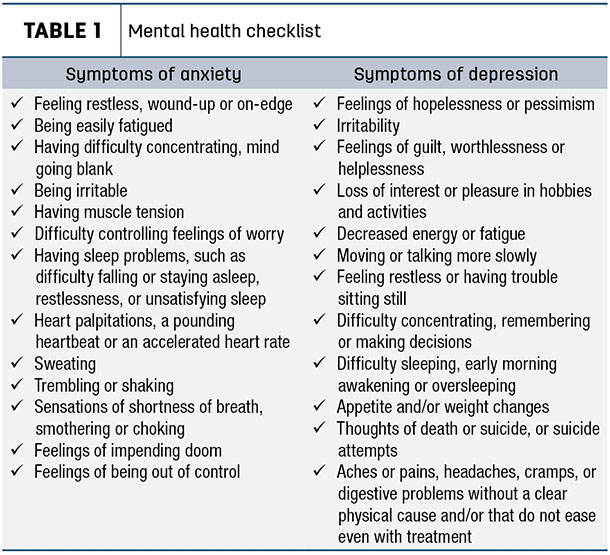You may wonder why it is such a “hot” news topic when we all know farming and ranching have always been stressful. My hope is this article will help you feel a little less overwhelmed and more empowered to take care of yourself, your family members, your friends and others in your community.
You are not alone. Many other farmers and ranchers across the nation are experiencing what you are. Many are facing financial hardships due to things out of their control like weather and dropping commodity prices. Financial hardship can also occur if there is not adequate health insurance to cover the costs of medical diagnosis for yourself or a family member. This can also lead to not visiting a primary care practitioner for health concerns. Collectively, as the human race, we don’t visit the doctor when the health concern has to do with our own mental wellness.
According to the National Institutes of Health, the brain is the most complex organ in your body. The brain controls everything you do. When your brain is not functioning at optimal levels, it can affect your thoughts, memory, speech, sleep, movement and personality. As busy human beings, we don’t always take the time we should to take care of our brain. We can very easily make excuses about why we don’t have the time to take care of the symptoms we are experiencing.
Would you go talk to a primary care practitioner if you were experiencing chest pains, stomachaches or having a hard time breathing? Our brain and how it functions should be given the same priority for care as the other organs in our body. When your brain is not functioning at optimal levels, it can affect your ability to live, to laugh and to love.
Sometimes we can make excuses for why we are not living our very best life. We can tell ourselves we can handle it. If you are noticing that you are struggling to be your best you (or if you notice a friend or family member who “just doesn’t seem like themselves”), you might be experiencing a mental health problem.
One in five Americans has been diagnosed with a mental illness or disorder. The most common are anxiety and depression. According to the U.S. Department of Human Services, individuals with “anxiety disorders respond to certain objects or situations with fear and dread, and depression is a mood disorder involving persistent feelings of sadness or periods of feeling overly happy, or fluctuating between extreme happiness and extreme sadness.” There are a variety of diagnosable illnesses that can affect a person’s thinking, mood and behavior.
It can be difficult to talk about what we are feeling. It can be difficult to open up to a loved one and say, “I am not feeling like myself.” It may be difficult to share with a loved one that you are worried about them because you are noticing they “haven’t been themselves lately.” Use the checklist in Table 1 of symptoms from the The National Institute on Mental Health to help with this tough conversation.

Use “I statements,” such as “I have not been myself lately, and I have been experiencing (insert symptoms here).” or “I am really worried about you; I notice that lately you have seemed (insert symptoms here); is everything OK?”
Most individuals can recall that they have experienced the symptoms of an anxiety disorder or depression during their lives. When these symptoms interfere with our ability to live, to laugh and to love for more than two to four weeks, be open and be honest about what you have been experiencing. It is important for you to contact your primary care provider. They will help you on the best plan for finding a diagnosis and refer you as necessary to the appropriate specialists.
I want you to know you are not alone. I have been living with generalized anxiety disorder for most of my life. I can recall many memories where my anxiety disorder affected my ability to live to laugh and to love. I am 47 years old and was diagnosed and began receiving treatment at age 32 after I realized I was not the mommy to my children that I wanted to be.
Some days are easier than others, but some days my anxiety can still be debilitating. I have learned to be open about my anxiety, and some people understand, and some can’t comprehend what I am trying to explain. But each day I try. Some days I still feel like I fail miserably, but I am not giving up. I encourage you to do the same. Talk to someone, seek treatment, and be honest when it is a good day or if it is a bad day. You are loved. You are worthy of a life where you can fully live, fully laugh and fully love.
If you are feeling like you need help right now, you don’t need to wait for that primary care appointment. Here are free and confidential help lines that you can call and speak to a trained professional.
- National Suicide
Prevention Lifeline,
(800) 273-8255, 24-7
- Crisis Text Line,
text HOME to 741741, 24-7
- Avera Farm and Rural Stress Hotline, (800) 691-4336, 24-7
- Farm Aid Farmer Resource Network, (800) FARM-AID
([800] 327-6243),
Monday through Friday
9 a.m. – 5 p.m. EST
PHOTO: Getty Images.
References omitted but are available upon request. Click here to email an editor.

-
Jami Dellifield
- Family and Consumer Sciences Educator
- Ohio State University Extension
- Email Jami Dellifield








